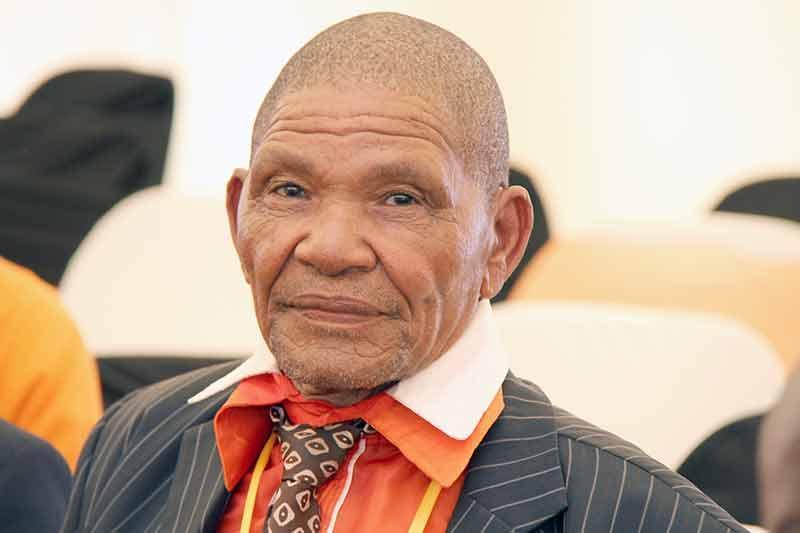Africa-Press – Botswana. In response to ongoing challenges such as land degradation, low water availability and habitat loss, residents of Molapo in the Central Kalahari Game Reserve (CKGR) have proposed for land zoning aimed at sustainable development within their community.
Mr Roy Sesana, spokesperson for the Basarwa community, presented the proposal during a recent Presidential Inter-Ministerial Committee consultation meeting held in the Molapo settlement. He emphasised that implementing land zoning within the game reserve would enable them to gain access to land similar to other developed communities across the country. This access, he said could allow for residential, agricultural, tourism, and industrial purposes.
However, Mr Sesana lamented that the dream of acquiring land for such activities remained distant, as government maintained that CKGR was strictly a ‘game reserve’, prohibiting any other land-related developments. He said there was need for a review of ‘these prohibitions,’ calling for the granting of land rights to improve the socio-economic status of the settlement’s residents.
In an effort to generate income, the community plans to establish consortiums specialising in tourism-related activities, such as constructing campsites, leveraging the region’s abundant natural resources. He emphasised their commitment to environmental preservation to prevent resource depletion.
While Basarwa are traditionally known as hunter-gatherers, Mr Sesana reassured attendees of their ecological awareness, citing strict territorial hunting borders that serve to protect local animal species from illegal hunting. He further noted that granting land rights would empower them to revive their culture through the establishment of cultural villages, potentially attracting tourists to experience authentic Basarwa culture.
Additionally, he called for regular maintenance of access roads in the game reserve, highlighting that their current condition complicated prompt service delivery from Ghanzi and hindered movement between settlements.
Another resident Mr Katshamikisiwa Moruakgomo, expressed gratitude for the establishment of the Inter-Ministerial Committee, noting that President Advocate Duma Boko has historically championed Basarwa land issues, including past legal challenges regarding their relocation. Mr Moruakgomo also advocated for the land board to extend its allocation services to the CKGR, as land remained a pressing concern for all communities within the game reserve.
Mr Kgothiso Gaorapelwe echoed the sentiments regarding limited land access, stating it had impeded their participation in government programmes like Ipelegeng and Thuo Letlotlo. Through zoning, he believes they could apply for poverty eradication initiatives and other socio-empowerment programmes.
Ms Bogento Setshabamolelo raised concerns about communication networks, noting that many lives were lost due to lack of emergency services, with the nearest clinic over 100km away. She urged the reinstatement of communication radios that previously facilitated contact with service providers.
Mr Ketshamikiso Kemiso called for youth empowerment initiatives in the area, proposing livestock production and farming programs to create job opportunities in a region where employment is currently scarce.
In his welcome remarks, Kgosi Lobatse Beslag highlighted the impact of relocations on local populations, stressing that restoring residents to CKGR from New Xade would enable better service distribution based on improved population metrics. He mentioned that their settlement’s location in Qweee Pan offered potential for tourism development, provided land rights are granted. Kgosi Beslag urged unity among local settlements to advocate for equality and shared progress in addressing common challenges.
Permanent Secretary in the Ministry of Wildlife and Tourism, Mr Boatametse Modukanele assured the residents that his team was dedicated to consulting with Basarwa communities in Ghanzi, which have been significantly impacted by mass relocations. He encouraged community input to find sustainable solutions to their socio-economic issues, emphasising the importance of all citizens being able to be buried at their respective sites.
Addressing other issues, Mr Modukanele noted that the previous provision for special hunting licenses had been discontinued, which had served as a control measure for hunting activities. He urged the community to propose alternative methods for managing hunting in the area.
New Xade East Ward Councillor Mr Galemphete Gakelekgolele called for abolishment of special licenses. He argued that the cultural ties of the Basarwa to conservation and sustainable practices, should guide any future policies.
The meeting concluded with a collective call for developments to be brought closer to communities rather than displacing them, advocating for a more inclusive approach to resource management and local empowerment.
For More News And Analysis About Botswana Follow Africa-Press






